DCE Menu
Main menu
- Spring Graduation Ceremonies 2025
- SRC Online Elections 2025
- Application & Registration Information
- Academic Calendar 2025
- Fees Booklet
- Academic Calendar 2026
- Study Opportunities
- ENVISION2030 Institutional Awards
- Career Leaflets
- Handbooks
- Court Order – Forums Threat
- ENVISION2030
- Why Choose DUT
- “Missing Middle” application form
- NSFAS New Students
- NSFAS
- Autumn Graduation Ceremonies 2025
- Honorary Doctorates
- DUTLink Newsletter
- Lecture Timetable
- Association of Commonwealth Universities
Community Engagement Projects
FACULTY OF ACCOUNTING AND INFORMATICS
Department: Deans Office
Name of the project: Preparing DUT and Durban Community for Fourth Industrial Revolution
Project leader: Dr. Knowledge Ngwane, ngwaneks@dut.ac.za, 031 373 6025
Partners: Google, Startup Grind
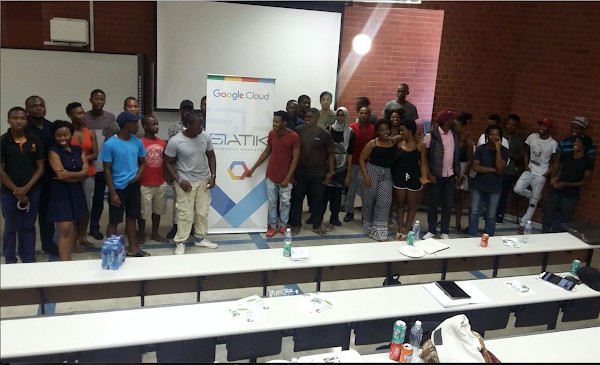
Project Outline
According to the World Economic report by 2020, the Fourth Industrial Revolution (4IR) will have brought us advanced robotics and autonomous transport,
Artificial intelligence and machine learning, advanced materials, biotechnology, and genomics. These developments will transform the way we live, and the way we work. Some jobs will disappear; others will grow and jobs that don’t even exist today will become commonplace. According to Report from World Economic Forum (WEF), some of the top skills that will be required for the future job are (1) creative thinking, (2) coordination with others and (3) people management. The aim is to help DUT staff and students to prepare and develop skills that are required in the fourth Industrial revolution. To prepare DUT students and staff we started an organization called Varsitygenie supported by DUT FAI and IT department and Google. Within this year (2018) Google has sponsored our 4IR technology training for DUT IT students with amount approximately to R90 000 that include training vouchers, cash for food, flight tickets and Accommodation for a summit that was held at Kenya. In addition, we hosted entrepreneurship events for DUT students that were aiming to educate and inspire students to pursue entrepreneurship. Startup Grind, DUT IT Department and FAI Dean Office sponsored events. To develop the skills that mentioned by WEF report that are required in 4IR we host following type of events:
Project Impact
During 4IR many jobs will disappear, Varsitygenie is already playing a big role in terms making students and Durban communities aware and training them for 4IR this will help them to fully participate in the 4IR as they will have necessary skills required to perform tasks in 4IR. Through Varsitygenie projects, University will be able to start to build a strategic partnership with Global companies. This partnership will help DUT get cutting-edge resources from global companies that will able them to deliver in-demand knowledge to students. Global tech companies are at a race to roll out their technology through Varsitygenie.
FACULTY OF APPLIED SCIENCE
Department: Mathematics
Name of the project: Plant-Back-Community Development Project
Project leader: Dr. Chuene Duba, thamadub@dut.ac.za, 031 373 2890
Partners: Tshepiso Mkhize (female) ND Mechanical Engineering S4 student, Alumni of Hunt Road Secondary School
Minenhle Khazi, (female) ND Journalism DUT, 1st year, Alumni of Hunt Road Secondary School
Malusi Zondi (male) BCom Accounting UKZN, 3rd year, Alumni of Hunt Road Secondary School
Zamani Sosibo (male) ND Retail Management, DUT, 3rd year, Alumni of Hunt Road Secondary School
Khosi Mbokotwana (female) DUT BTech Accounting and Financial Management, an employee of eThekwini Municipality, Alumni of Hunt Road Secondary School

Project Outline
The project aims to plant back to the schools where DUT students come from with the purpose of adding value, developing, investing and making the change they want to see. Currently, Hunt Road Secondary School on King Dinuzulu Road, Berea, is the focus. In October, this year, four former students partnered with me to visit the school, to motivate matriculants before exams and to give them pep talks on life after matric. Hunt Road Secondary school is under threat to lose its status and be labeled disadvantaged because it does not have a computer lab and the library and most of the learners come from nearby townships. The focus now is to raise funds for a computer lab with about 30 computers so that learners are computer literate by the time they leave school and they are on par with their counterparts who are schooling in CBD areas. See https://www.iol.co.za/dailynews/news/move-to-cal-hunt-road-school-disadvantaged-1754402
Project Impact
To offer a better education to a child is never a wasted effort. When the child is better educated from school, they tend to adjust better at tertiary institutions. This will market the university and show that the university is concerned about the feeder schools around it. Even if these learners do not get to tertiary institutions, they will be computer literate to survive in this digital era. Learners will be able to access e-learning materials in all subjects in the absence of library.
FACULTY OF ARTS AND DESIGN
Department: Drama & Production Studies
Name of the project: ‘IZIMPANDE ZOBUNTU’: Roots of Ubuntu – Play and Film ‘The Circle of Life’
Project leader: Dr. Pamela Tancsik, pamelat@dut.ac.za, 082-403-1707
Partners: Kanya Padayachee, Project coordinator at Gandhi Development Trust
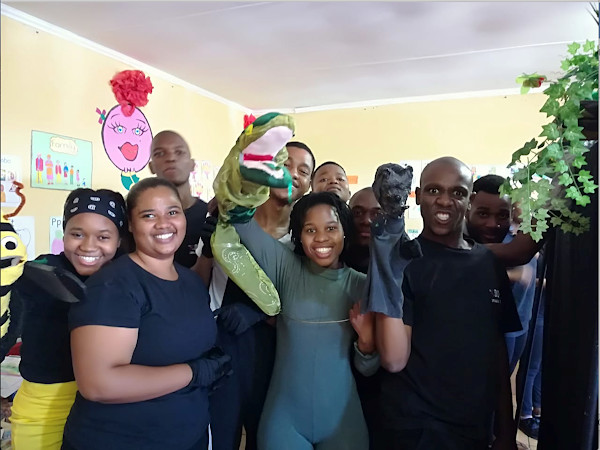
Project Outline
The purpose of this Early Childhood Development (ECD) programme is to share knowledge: the community practitioners bring the specialist ECD knowledge and local context and the students share information on the use of the creative arts and theatre as effective teaching and learning tools. The primary objective of the ECD Values Project is to develop in the practitioners/caregivers a values’ frame of reference for the children in their care to model. Accordingly, the Education Theatre productions are values-based to reinforce the aim and content of the project. The 50 students who had chosen the specialization ‘Educational Theatre’ in Drama & Production Studies created and workshopped a story with the title ‘The circle of Life’ based on the principals of ‘Ubuntu’. The story was performed with puppets and told by storytellers together with interactive songs and dances for foundation phase children. It was first performed at the Waterloo ECD community. In the second semester, the same students turned the “Ubuntu’ story “The circle of Life’ into a 15 minutes TV puppet film for foundation phase. Violence in all its forms abounds in our society and our current culture reflects a serious lack of social responsibility and an unhealthy compulsion to succeed at any cost. Against this background, children are not likely to develop, naturally, into caring and socially responsible adults since a great deal of their learning and behavior is a function of observing and imitating the behavior of people around them.
Project Impact
This form of CE demonstrates the importance of mutual and reciprocal knowledge sharing between the university and a community where the latter sector is not the passive recipients of the knowledge that the former bestows. At the heart of this initiative is the sincere and conscious attempt at breaking down power relations between University stakeholders and Community participants and, thus far, we feel strongly that our efforts are going some way towards realizing this objective.
Department: Fashion and Textiles
Name of the project: Sewing 4 Africa & Fashion and Textiles community engagement
Project leader: Khaya Mchunu, KhayaM@dut.ac.za, 031 373 2737
Partners: Nozipho Tembe & Karen Stuart
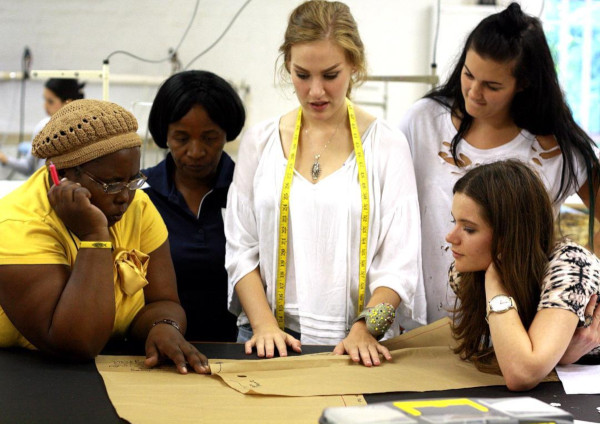
Project Outline
The project is conceptualized as a design partnership between Sewing 4 Africa sewers and second-year fashion students from the DUT. For a semester, they partner on a design of a fashion product which serves as skills sharing and exchange. The project is underpinned by the institution’s strategic focus area 1 with a particular focus on the development and strengthening of students’ ethical citizenry and social responsiveness. By sharing skills learned in the university and applying them in a real-life context for the betterment of a section of their community students exercise this envisioned institutional goal.
Practically, a sewer joins a group of students and the groups meet on a weekly basis at the Fashion and Textiles Department to manufacture the product. The product is designed by incorporating skills the student would have learned in their first-year level as a way to promote the sharing of this skills but also importantly, the incorporated techniques should serve as a way to provide their partner with these skills. This partnership is implemented to promote instances where the economically marginalized in society are given the opportunity to learn skills for self-employment or employment such as sewing skills.
Project Impact
So far since the inception of the project, some past sewers have ventured into other activities outside of sewing. However, five continue with sewing with most for income generation. One has started an entire line of church gears, another makes a combination of basic linen wear and clothes and another makes basic pinafores that she sells in Matatiele and hopes to sell in Newcastle too. Others continue to look for more training in sewing.
Department: Adult and Community Education Unit
Name of the project: Corkwood Academy NPC
Project leader: Mbhamali Samukele Prominent, samukelem@dut.ac.za, 071-821-1624
Partners: Samukele Mbhamali, Mpumelelo Mncwabe, and Thokozani Nzimande; Ward Councilors
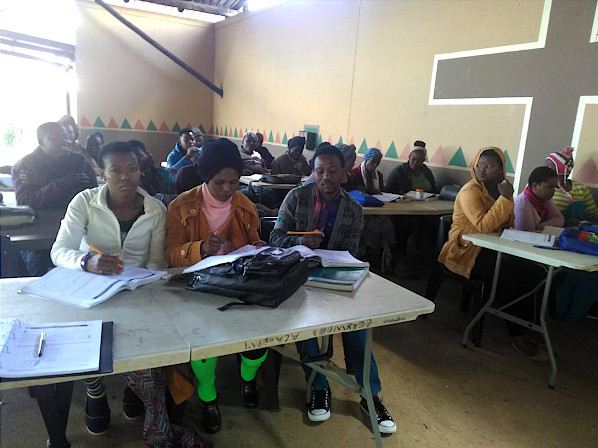
Project Outline
The programme is delivered in Community Halls close to learner’s homes. The unemployment rate in Kwa Zulu-Natal in March 2016 was 23.6% more than 50% have an education achievement level less than National Senior Certificate (www.statssa.gov.za). The stats are likely to be higher in rural areas targeted and educational achievement levels lower. This indicates a real need for the AET interventions proposed. At present Corkwood is operating at Mevamhlophe Empangeni area, uMkhanyakude Municipality. We have 40 learners who are doing AET Level 2 with 2 educators. We are looking for funding which can help us to apply for accreditation. We are a nonprofit working with accredited companies costs a lot. We would like to add Economics Management Science, Life Orientation, IsiZulu and Life Science in AET Level 3 and Level 4 so that all the learners who will pass level 4 under Benchmarking Examinations (Umalusi) will be able to register with any TVET colleges. Corkwood in association with Media Works Durban who provides academic quality assurance and summative assessment by Benchmark, an Umalusi Accredited Assessment Agency. All facilitators are isiZulu first language speakers with academic qualifications appropriate to the subjects offered. A full programme from Level 1 to Level 4 (NQF Level 1) will take a typical candidate one full academic year. If the entry educational level of sufficient candidates as determined by the Benchmark Pre-Placement Assessment process is higher than Level 1, it may be possible for more unemployed people to benefit from the programme.
Project Impact
The Adult and Community Education Unit at DUT should play a vital role in working with communities. They have donated books published by the staff members to the AET centres of KwaZulu Natal, Gauteng, Western Cape, Mpumalanga Province, and Eastern Cape. Corkwood was one of the luckiest AET centres to receive that donation. Four learners have received Zulu novel and English books to promote reading our communities. The educators of Corkwood will be registered with DUT in 2019. They will be enrolled in Advanced Diploma in Adult and Community Education. Working together with DUT the Corkwood learners get free career advice from A&CE unit staff and planning get help communities of PMB using DUT free Wi-Fi where DUT staff will teach them cellphone banking, how to use internet using their smartphones, voter education, healthy lifestyle, how to search information for their assignments. DUT staff will use Saturdays and Sundays voluntarily with the help of the community members, ward counselors’ and pastors.
FACULTY OF ENGINEERING AND THE BUILT ENVIRONMENT
Department: Urban Futures Centre
Project Name: African Centre for Hope: An All of Society Response to Low Income
Drug Users in Durban
Project leader: Prof. Monique Marks, moniquem@dut.ac.za, 084-403-3934
Partners: City Manager’s Office – eThekwini Municipality; eThekwini Safer Cities Unit; eThekwini Health, TB, HIV Care Units; Dennis Hurley Centre; Women in Architecture
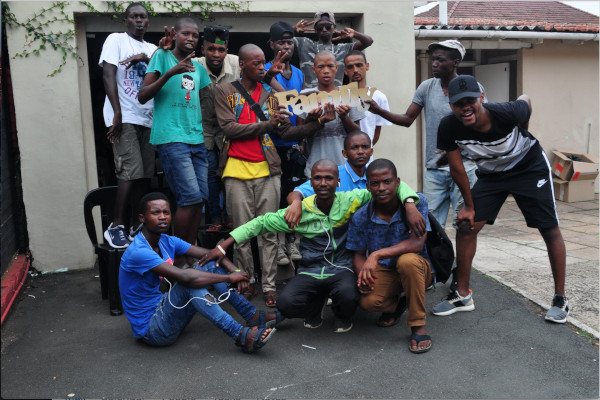
Project Outline
Durban is witnessing a dramatic increase in problematic heroin use, particularly among young people from low-income communities. There is only one public ‘rehabilitation’ centre in Durban, with a ‘success’ rate of only 7%. For the most part, people with a heroin use disorder are treated as criminals, further marginalizing them and offering no hope to them or their families. The Urban Futures Centre at DUT is partnering with a range of state and non-state actors to create an African Centre for Hope which will provide a range of evidence-based interventions for people who use drugs at an already existing, government-owned, drop-in- centre based in the CBD. Currently, the existing drop-in- centre, run by the Safer Cities Department, is only able to offer a feeding scheme and nominal psycho-social services to homeless people who use drugs and their families. Based on international best practice, this network will design the existing space to provide a range of interventions that reduce the harms associated with drug use. These include a needle syringe programme, an opioid substitution therapy (OST) programme, an overdose prevention centre, and spaces for dialogue for people who use drugs and their families. At present, nothing of this nature exists in Durban, in South Africa or even on the African continent. This project is a whole-of-government and whole-of-society initiative, it’s trans-disciplinary bringing together a range of disciplines with practitioners from fields including health, law enforcement, social development, and architecture.
Project Impact
This project will provide a range of interventions to communities that are deeply affected by problematic drug use. Access to such interventions is currently not publicly available to affected individuals and communities in the eThekwini.
Project Name: Undetectable=Untransmittable(U=U): Building Hope and Ending HIV Stigma
Project leader: Prof. Monique Marks, moniquem@dut.ac.za, 031 373 2180
Partners:
Dr. Innocent Tinashe Mutero: Is an artivist and young academic whose work centres on facilitating and documenting how marginalised and broken communities use the arts and by extension cultural capital for reintegration and as a coping mechanism.
Runyararo Marima: Participatory Action Research Specialist
Dala (Doung Jahangeer): Dala is an interdisciplinary creative collective that believes in the transformative role of creativity in building safer and more liveable cities.

Project Outline
DARE uses disruptive innovations through expanded creative placemaking (edutainment theatre, participatory performing arts), to engage the DUT community at the ML Sultan and Steve Biko campuses with the scientific findings of the HPTN 052 study. The HPTN 052 study was a randomized control Trial to determine whether antiretroviral therapy can prevent sexual transmission of HIV in sero-discordant couples. The results showed a 96% reduction of HIV transmission within the couples to early ART which was considered a breakthrough (Cohen et al, 2011).
While this study has been successful it has not been publicized, there is little awareness among the student’s community and indeed in South Africa about the Undetectable=Untransmittable results. Therefore, DARE seeks to:
- Raise awareness on the HPTN 052 study;
- Influence positive attitudes and behaviour and promoting adherence to uptake of ARVs reducing the transmission of HIV;
- seeks to empower to make informed decisions around HIV testing, using treatment as prevention of HIV, and adherence to treatment.
Unique to this project is the banding together of expertise and activities from the community performance arts, humane architecture, public health scientists, social scientists and applied ethnomusicologists/ dramatists in a project that follows emancipatory participatory methodologies. Performance and arts exhibitions will be done at places conveniently accessible to the community.
Project Impact
It follows a user centred design and piloting where the DUT community (students, academics and support staff) developing and trying out some new approaches based on what we have learned. Work collaboratively with students, staff and members form the wider community.
User-centred research—talking directly to the university community (mostly young people) to gain a better understanding of barriers and motivators to accessing HIV counseling and testing services. Primary resource for the project is easily accessible, it’s the culture produced, consumed and reproduced by the DUT community and its environment in a process called the sociality of the campus.
FACULTY OF HEALTH SCIENCE
Department: Homoeopathy
Project Name: Kenneth Gardens Homoeopathic Community Health Centre (KGHCHC)
Project leader: Dr. Ingrid Couchman, ingridc@dut.ac.za, 031 373 2482,
Partners: Dr. I Couchman (head clinician), Dr. K Naidoo (clinician), Dr. J Ngobese-Ngubane (clinic director), Dr. M Maharaj (Head of Department Homoeopathy), Senzokuhle (community non-profit organization headed by Miss K Sibiya in Kenneth Gardens)
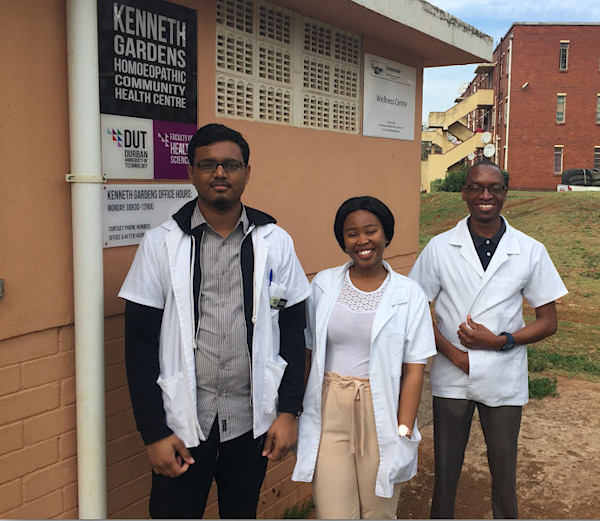
Project Outline
KGHCHC was established in 2012 to assist the community of Kenneth Gardens with their health issues. There is no municipal clinic in the area, and the hospital assigned to the area is 20km away in Wentworth. The community is largely elderly as it was initially established as a housing facility for medically boarded individuals. The Homoeopathy Department became involved with offering health services to the community for free one day a week. The health centre operates every Monday morning from 9-12 and offers the community free homeopathic treatment. The very special service we offer the community members is that the students with a clinician go on house visits to those patients who are incapacitated and therefore cannot attend the centre. The centre works in conjunction with Senzokuhle, which is a non-profit organization that is run by ladies of the Kenneth Gardens community, who assist those who are house-bound with everyday chores. On average, the centre sees about twenty patients per day, and is an excellent teaching facility for our final year students, as they get to see patients in a real-life setting with the challenges facing the community. The students also benefit from seeing patients on a regular basis and thus can follow the patient’s progress.
Project Impact
The health of the community has been vastly improved. With the involvement of the department, we were also able to establish a vegetable garden for the community as part of the third years’ Personal and Professional Development Module. This has added even more benefit to the community. The health benefits as well as the social impact of showing an elderly person care and concern also plays an important role in changing someone’s life.
Name of the project: Ukuba Nesibindi Homoeopathic Community Health Project
Project leader: Dr. Jabu Ngobese-Ngubane, jabulilen@dut.ac.za, 078 926 9818, 031 373 2484
Partners: Lifeline, Warwick Junction Community
South African Natural Products, eThekwini Municipality, Early Morning Market
Registered Homoeopaths: Dr. J Ngobese-Ngubane, Dr. Richard Steele, Dr. D Naude, Dr. M Maharaj, Dr. R Hopkins, Dr. C Hall, Prof. Ross, and Students
DUT Co-op Department
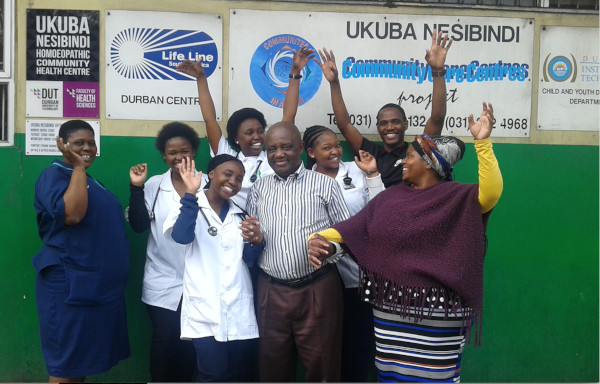
Project Outline
The Department of Homoeopathy in collaboration with Lifeline established its first satellite community clinic in 2004 located in Warwick Junction. The Homoeopathic Community Health Centre (UNHCHC) mainly known as Ukuba Nesibindi which is translated “to have courage” serves as a free primary healthcare service in the Lifeline building in Acorn Road. This project gives students the opportunity to actively consult with patients in clinical environments allowing them to be exposed to a range of conditions and treatment modalities. This provides students with a crucial practical foundation and a clinical environment in which to apply their theoretical knowledge under the guidance of experienced qualified homeopaths which is line with DUT’s strategic plan of collaborations, practical engagement and partnerships with stakeholders for sustainability. The clinic is run by senior students under the supervision of a qualified homeopath and funded totally by the Department of Homoeopathy. The clinic is open weekdays this accessibility has been effective, the number of patients seen at this facility has increased tremendously. We have had 7186 consultations from 2004 to date.
Project Impact
This project arose from the needs of the community identified by NPOs and organizations within the community, they, in turn, approached the department for assistance. The project has provided access and consultation services to 7 186 individuals, it is in existence for 14 years. The services are improved using feedback and recommendations collected from engaging with communities. The facility offers free homeopathic care and treatment from a minor cold to chronic diseases such as HIV related diseases. It’s a holistic approach that deals with the mental, emotional and physical wellbeing of our patients. It is an attempt to harness the social commitment, knowledge, and expertise and skills of our staff and students, and to forge mutually respectful, beneficial and reciprocal relationships with the communities we serve. We also seek to develop as individuals and as citizens through a process of discovery, listening, understanding and contributing.
Name of The Project: The Status of Homoeopathic Community Engagement Contextualized as Integrated Service and Learning, At the Homoeopathic Community Health Centres at the Durban University of Technology (DUT)
Project leader: Dr. Madhu Maharaj, madhum@dut.ac.za), 031 373 2514/ 083 388 2688
Partners:
- Dr. Madhu Maharaj (Head of Department Homoeopathy
- Dr. Jabu Ngobese-Ngubane (DUT Homoeopathic Community Health Centres Director. Head Clinician at Ukuba Nesibindi Homoeopathic Community Health Centre)
- Dr. Silvana Nienaber (Clinician at DUT Homoeopathic Community Health Centre)
- Dr. Ingrid Couchman (Head Clinician: Kenneth gardens Homoeopathic Community Health Centre)
- Dr. Euvette Taylor (Community Engagement Project Coordinator at Cato Ridge Clinic. Clinician at Cato Ridge Homoeopathic Community Health Centre)
- Dr. Vanishree Alwar (Head Clinician at Redhill Homoeopathic Community Health Centre)
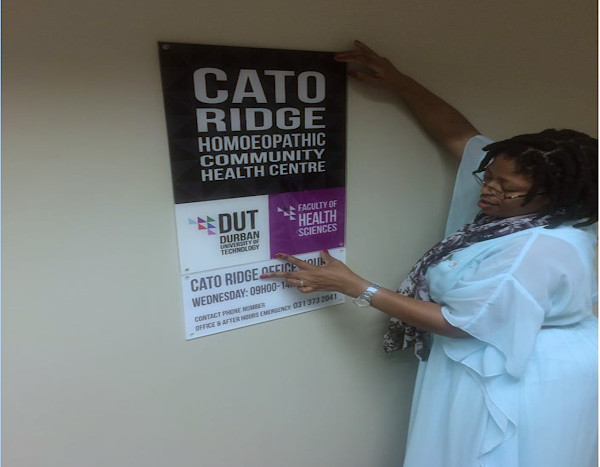
Project Outline
The Department of Homoeopathy at DUT prioritizes community engagement as an important aspect of the academic programme. The DUT emphasizes an ethos of engagement and student-centredness in all activities at the University. Teaching, learning, and research activities are embedded in the community engagement projects that are conducted at the Department of Homoeopathy at DUT. In this light, at four satellite Homoeopathic community health centres (HCHC) free homeopathic medical services are conducted daily and weekly. These clinics are situated in the greater Durban area and service varying communities with respect to health care needs. At the DUT HCHC, free services are offered to the DUT staff and student community daily. In addition, there are four satellite HCHC which are:
- Ukuba Nesibindi Homoeopathic Community Health Centre
- The Redhill Homoeopathic Community Health Centre
- Kenneth Gardens Homoeopathic Community Health Centre
- Cato Ridge Homoeopathic Community Health Centre
Project Impact
Free homeopathic medical services to communities with little or no access to health care.
Department: Deans Office Health Sciences
Name of the project: Kwamkhizwana Village Community Health Project
Project leader: Dr. Euvette Taylor, euvettt@dut.ac.za, 031 373 2917
Partners: Community representatives by the tribal leaders; iNkosi and iziNduna,
Politicians (Ward Councilors)
Department of Cooperative Governance and Traditional Affairs (COGTA),
eThekwini Department of Health and private practitioners registered with their respective councils
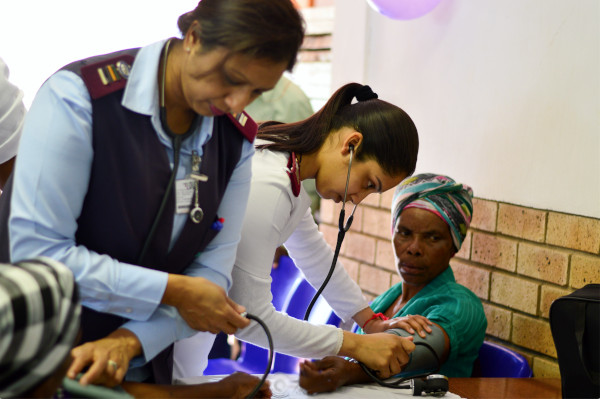
Project Outline
The KwaMkhizwana Village Community Health Project is a multi-disciplinary community engagement project in the Faculty of Health Sciences. The National Development Plan (NDP) Vision 2030 seeks to re-emphasize primary health care (PHC) through re-engineered PHC (Republic of South Africa 2011: 295), focusing on health promotion and disease prevention. The Faculty of Health Sciences identified a resource-poor community in the eThekwini Municipality in order to provide health care resources whilst ensuring student training and development of social responsibilities. KwaMkhizwana is a tribal area on the outskirt’s northwest of Durban at the rural Cato Ridge. The KwaMkhizwana community is saddled by unemployment, life below the poverty line, poor sanitation and limited access to clean water and health care. Other medical needs can only be accessed through irregular, informal transport to and from the nearest medical facilities in neighborhood tribal authority and/or city. As a result, many patients default treatment or do not seek medical attention. The community now receives a weekly clinic from a multidisciplinary health team from DUT. It is the trans-disciplinary nature of the project. It is bringing together of various disciplines within a single coordinated effort to deal with community issues that make this project unique and gives it the strength it requires to make an impact.
Project Impact
Partnerships are critically in contributing to the national development effort and social transformation. The project established in KwaMkhizwana tribal area is in response to community needs within the context of local conditions. The project is student-driven (SFA1). All consultations are done by senior students (SFA1) supervised by qualified and registered practitioners with their respective councils. Its impact is gained given that the classroom learning space transcends itself to the community space where students gain the requisite practical experience yet become more aware of the realities of the South African context and develop empathy towards community members’ plight within poor socio-economic areas.
Department: Community Health Studies
Name of the project: In response to community health challenges: Alleviating the burden of non-communicable diseases among residents in the Mkhizwana rural area in Cato Ridge, Durban
Project leader: Prof. Poovendhree, PoovieR@dut.ac.za, 082 321 4932, 031 373 2808
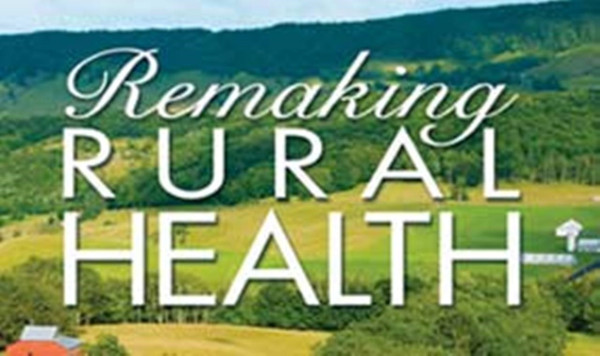
Project Outline
Mkhizwana is a resource-poor rural area is riddled by unemployment, poor sanitation and limited access to clean water and health care. Health-related problems affecting this population were discussed at a community meeting with residents, the tribal council and the CHS staff. Residents identified certain non-communicable diseases (NCDs) such as skin disorders, diabetes, and hypertension as a threat which is exacerbated by limited access to healthcare. Skin disorders caused great anxiety; while the community also showed a general lack of understanding related to management and control of NCDs.
We decided to intervene in the following ways: they needed access to specialized dermatology diagnosis and care which was not available at the local community clinic. Risk factors for these skin disorders needed to be identified and controlled or eliminated. Finding out existing knowledge and practices around managing diabetes and hypertension and provide health education based on the results. This CE project will investigate the clinical concerns identified by residents: (1) For skin disorders: Environmental Health (EH) students will administer questionnaires to ascertain risk factors associated with skin disorders. Results will be communicated to the community forum. (2) For diabetes and hypertension: Two focus groups will be done to ascertain current practices and knowledge regarding onset, risk, and management. Health education will be provided by EH students based on the results.
Project Impact
We want to treat the cause through investigation of risk and intervention. Education would be important to assist the community to understand how to actively avoid and manage NCDs. The project enhances teaching and learning; gives a practical experience of conducting health-related research with community-level health education, it gives an opportunity to collaborate and impact positively on a disadvantaged community. It further provides training in an under-resourced community, this is aligned to SFA1 (as per DUT’s strategic plan) for building sustainable communities of living and learning by developing and strengthening both student and staff contributions to the outside community; and entrenching DUT’s external engagement.
Department: Chiropractic
Name of the project: Chiropractic Department Community Engagement
Project leaders: HoD: Dr. Docrat, adild@dut.ac.za, 031 373 2589
Clinic: Dr. Varatharajullu, desireev@dut.ac.za, 031 373 2533
Community Engagement & Careers fairs outreach: Dr. Korporaal, charmak@dut.ac.za, 031-373-2611
Partners: All Departmental staff
All Masters students, BTech and WCCS students, Alumni
Narain Jeawon Vedic Centre, ADRA through their Marburg Haven
Faculty of Health Sciences through the Mkhizwana project
Multiple community partners for the community events and the sporting events (e.g. Pink Drive, Hollywood Bets, Games, Clover through Maritzburg Marathon, individual running / baseball/softball clubs (as examples), CrossFit boxes, DUT PR Department, DUT Recruitment Department)
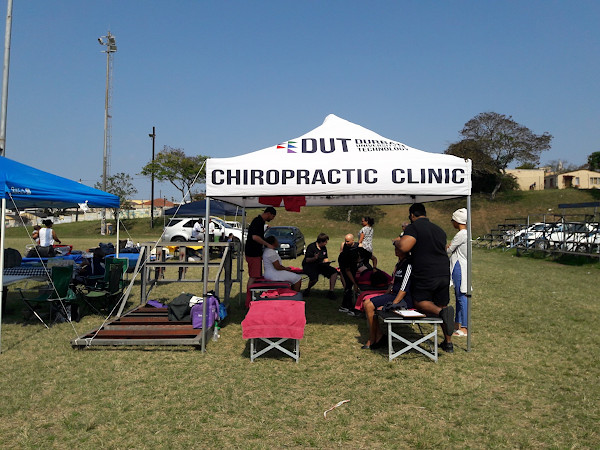
Project Outline
The Chiropractic Programme within the Faculty of Health Sciences has an extensive community engagement and outreach programme. The core of this is the provision of services to low-income patients residing in the greater eThekwini Municipality, through the Chiropractic Day Clinic. Satellite clinics include the Avoca Hills Clinic at the Jeawon Narain Vedic Centre, the Chiropractic Clinic (in conjunction with the Faculty of Health Sciences) in the Mkhizwana Valley (Valley of the 1000 Hills) and the Marburg Haven Clinic (situated in Marburg/Port Shepstone), were identified by needs within the respective communities. Additionally, the above clinics are augmented by inter-professional Corporate Wellness Days, Community Initiatives (KwaMashu Picnic, CTP Bonela, and other community outreach events) and school-based spinal screenings [at the request of NPOs and community groups] that provide chiropractic services (and health care services) to the population of the Ugu district, Msunduzi and eThekwini Municipalities. Students and staff also provide chiropractic services within an inter-professional setting to athletes (up to 80 per year) at developmental, regional, interprovincial/national and international events.
Project Impact
The project results in improved student training, clinical and development of graduate attributes. The community gets access to a service they wouldn’t normally afford, they also become educated and aware of their health and get referrals where necessary. Partners like RCL get a chance to develop communities, they reduce their MSK complaints and reduce their business risk.
FACULTY OF MANAGEMENT SCIENCE
Department: Entrepreneurial Studies and Management/ ENACTUS
Name of the project: Vinso Art
Project leader
Lana-Ann Brady, lanab@dut.ac.za, 031 373 5695
Partners: Simunye Women Traders Association; Riverside Hotel; SAMID; Belaire Suites; The Balmoral
Project Outline
Vinso Art was started after realizing that hotels discard their linen in an average of 3 to 6 months, whilst the average lifespan of a linen is 3 years. This linen often ends up in our landfills and generating methane which is a very harmful greenhouse gas. This project also recycles different types of fabric to make a variety of cloths. This is a small business formed by two young Durban creatives, Aphiwe and Lungelo. Vinso Art is all about helping people embrace their cultural identity in modern times. This is done by producing a number of fashionable products to help the customer feel more confident and prouder of their origin. Vinso Art produces its very own customized products such as jackets, denim bags, shirts, hats, aprons, dresses, table dressing napkins, runner, couch pillows from upcycling fabric and linen which would have been wasted or otherwise landed up in landfill sites.
Project Impact
Unemployment is a critical issue in South Africa hence the need for such projects that will hire people whilst contributing to the nation’s economy. By recycling discarded linen, the environment is saved from greenhouse gasses such as methane and allowing our communities to live in a safer and cleaner place. Students at DUT have the chance to work in the project thus giving an experience needed in an ever-changing world.
RESEARCH INNOVATION AND ENGAGEMENT
Department: International Centre of Nonviolence
Name of the project: Durban Leadership Programme
Project leader: Crispin Hemson, icon1@dut.ac.za, 031 373 5499
Partners: Mr. Sibusiso Xaba, Lindelani Community
Other community members at Lindelani, Ntuzuma
WESSA, Durban Branch
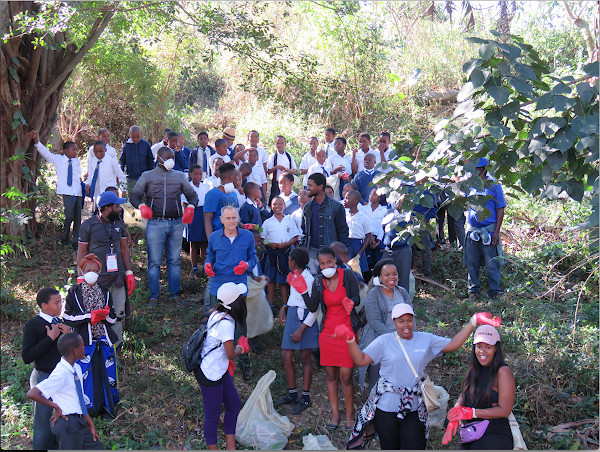
Project Outline
About 30 students are taken every year through a programme of talks by leaders, student presentations, reading and involvement in a specific community project. In 2018 the work has focused on one project, developing a Peace Forest in Lindelani, Ntuzuma. The emphasis is on developing participants as ethical leaders and as leaders who serve communities rather than exert power over them. Students who participate fully in all aspects receive a non-formal Certificate of Participation.
Project Impact
‘Community’ in this Programme refers to the participants on the project, the broader DUT community and the community of Lindelani (with regards to the current project focus). The impact is on developing leadership in all three contexts and to fostering innovation and self-reliance and the ability to work in groups.
Name of the project: ICON School Engagement Project
Project leader: Crispin Hemson, icon1@dut.ac.za, 031 373 5499
Partners: Futura High School, Wiggins Secondary School, Hunt Road Secondary School, Sastri College
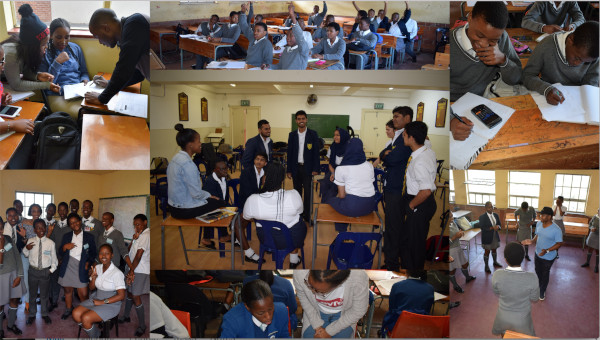
Project Outline
The project aims to develop a close relationship between DUT and participating schools. It does so through four pillars: providing the skilled resource of a retired principal to support school management, learner mentoring in gateway subjects by DUT senior students, peace clubs, including conflict resolution skills and the development of peace mediators, and a social entrepreneurship competition in which learners will address problems facing their communities. The development of the project has adapted to the context of each school. A key element is the training and ongoing support to mentors and tutors so that they are developing skills that extend their disciplinary knowledge and enable them to see themselves as change agents in society. A further element of the project is to strengthen the links between schools and the university, enabling learners to transition more effectively from secondary to tertiary education, and presenting the academics connected with a deeper understanding of the issues facing learners and schools. As one of the mentors says, “What I have learned from being a mentor is that my own actions have a huge impact on the learners I facilitate. Me living the project’s values has a huge impact on them because they now live and breathe those values.”
Project Impact
A key element is the development of young, purposeful and passionate leaders with a commitment to addressing the challenges facing society, as well as the confidence that they can make a difference. Further, the investment of society in both schooling and higher education becomes more effective as youngsters understand how to bridge the differences and how to build confidence in their own abilities. We anticipate that as they enter universities like DUT, the young people from the schools will move with greater confidence and clarity in achieving their academic goals, thus enhancing their ability to contribute socially and economically in South African society.
Department: Institute for Systems Science
Name of the project: Increasing the use of Technology and Social Media for NGOs
Project leader: Samukelisiwe Nhlabathi, samukelisiwen@dut.ac.za, 031 373 6711
Partners: Urglobal; DUT IT Department; HakaConnect.org; DUT Entrepreneurship Centre and Desk; DUT Department of Law

Project Outline
The internet and social media, in particular, is a powerful tool for raising awareness for social causes and charity events. It is important that the non-government organizations (NGOs) adapt to the digital age and use technology to communicate with supporters and donors. Due to the lack of understanding technology, most NGOs are not able to use online platforms and miss out on opportunities to engage with broader communities to raise their visibility and voice. The project seeks to increase awareness on the benefits of using technology and social media to Community-Based Organisations (CBOs) and NGOs. The project will train these organizations on how to develop and manage online platforms and then use them to showcase the work that they do to attract more support and funding for their programmes.
Project Impact
The communities will receive more understanding of online platforms, how to develop them and use them to increase their voice and visibility. Partners will get more skills and experience in understanding how communities engage with online platforms and how best these platforms can be used to maximize the positive impact they have in dealing with the issues that communities are facing. The university will get an opportunity to gather more evidence on how online platforms are used by communities which will then inform teaching and learning and open more opportunities for research.
SUPPORT SERVICES
Department: Library Services
Project Name: DUT Library Community Outreach Project
Project leader: Ms. Lucille Webster, websterl@dut.ac.za, 031 373 5546
Partners: Library and information Studies; School of Education; Writing Centre
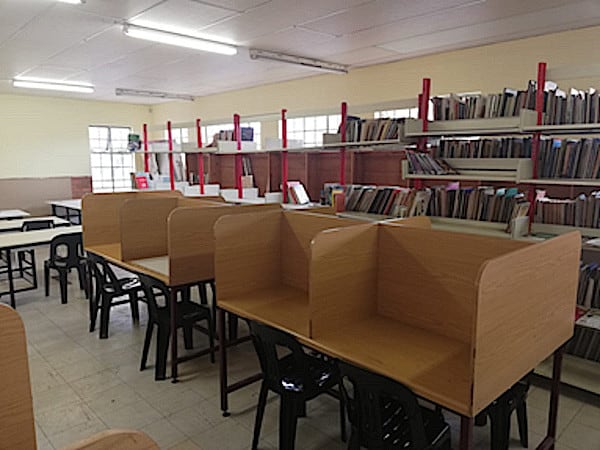
Project Outline
The project is geared to support the Imbali Education Precinct concept. The concept objectives are to open access to Imbali community to DUT facilities through a number of interventions between 9 schools, community college, TVET college and community at large. The concept also intends to establish communities of practice in various fields of operation. The focus is as follows:
- Provide Library expertise;
- LIS- advisory capacity;
- Writing centre – partner with library to provide academic writing.
Project Impact
Improving lives of communities of Imbali, a model that will be emulated by the country as a whole. The concept is imported from the USA.
